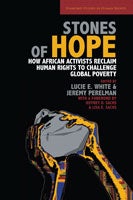On Nov. 19, Harvard Law School Professor Duncan Kennedy and Jeffrey Sachs, Columbia University professor and special adviser to the United Nations Secretary-General, discussed a new collection edited by HLS Professor Lucie White ’81 and Jeremy Perelman, S.J.D. ’11, before a large audience at HLS.
That collection—“Stones of Hope: How African Activists Reclaim Human Rights to Challenge Global Poverty”—combines case studies from activists with theoretical essays on development to “tackle problems of disenfranchisement and poverty in the world,” said HLS Professor William Alford ’77, vice dean for the Graduate Program and International Legal Studies, who introduced the discussion of the book. “While the authors are not adverse to the deployment of rights in the conventional way, they understand that this might not be efficacious given structural problems in realizing equality,” he observed.
Kennedy called the collection “the best book about social and economic rights that I’ve read,” citing its “great narrative power that relates the on-ground intimacy” of the local struggle for human rights. He also praised the manner in which the research underlying the book was conducted, saying “the book was produced by a collaborative experience that is prefigurative of what academic life could be in a better world.”
Yet Kennedy took issue with the way the book contextualizes the problems of poverty and rights deprivation, arguing that it fails to convey a sense that “deprivation is a function of the causes of capitalist development.”
He also disagreed with the collection’s presentation of rights as concepts “whose content is already well understood.” He said, “In my interpretation, what the book illustrates, despite its claim that rights have already been clarified, is that you have to make a new doctrinal strategy in each situation.” Because of this “radical indeterminacy at the legal level,” rights must be tailored to each situation and “require full contextualization to say what is a plausible realization of a right.”
Kennedy offered a final point of divergence, stating that he sees human rights as “not just non-observed legal rights,” as they are characterized in “Stones of Hope.” Instead, Kennedy argued that “human rights are an ethical and rhetorical language that provide a way to convey passionate demands of a group on the collective [whole].” He noted that this understanding of human rights supports the idea that since those in poverty are “not just left behind, we must instead change the course of development so it’s not producing injustice.”
Sachs, who served as director of the UN Millennium Project and special adviser to UN Secretary-General Kofi Annan on the Millennium Development Goals—internationally agreed upon goals to reduce extreme poverty, disease, and hunger by the year 2015—disagreed with Kennedy’s critique of development, framing it as an historical escape from extreme deprivation. “Two hundred years ago half of infants died before age 5 in Ghana, just as in the rest of the world,” Sachs said. “Extreme poverty is not a product of development. Instead, extreme poverty is a fundamental historical reality, but one that we have a chance to let people escape from … in ways they couldn’t 200 years ago.”
Sachs observed that human rights enter the struggle for material improvement in two ways. First, he noted, “exploitation accompanies extreme poverty” because those in severe deprivation “lack resources for defense against those who would take advantage of them.” Second, Sachs argued, the history of economics teaches that extreme poverty exists today “mainly because poverty was the base historical condition.” Although “poverty has been decreasing over time,” the “15 percent of the world’s population still living in poverty amounts to 1 billion people,” said Sachs. And human rights provides a way to act against that “shocking tragedy” that 1 billion people die from “the residual legacy” of a condition that used to affect most of the population.
– Greg DiBella
